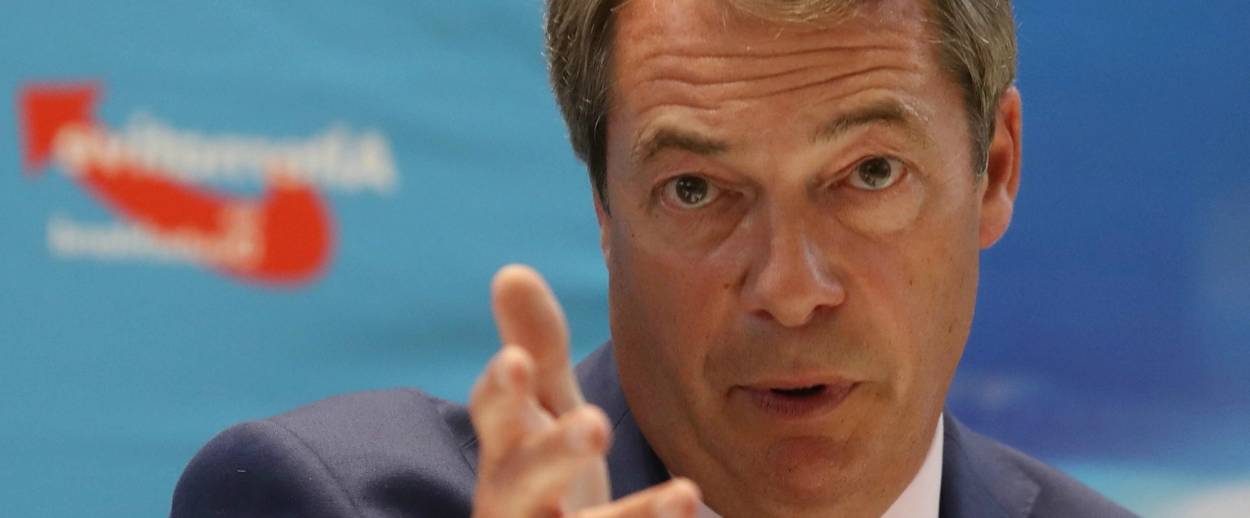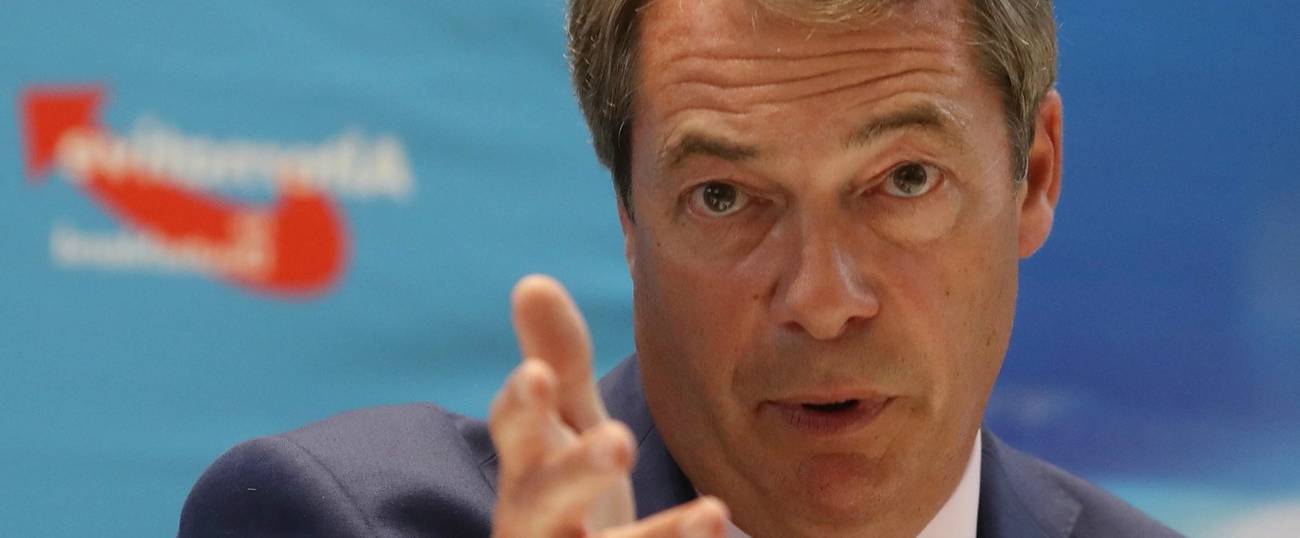Nigel Farage, Trump’s Favorite British Politician, Goes on Anti-Semitic Riff About ‘The Jewish Lobby’
The architect of Brexit indulged the suggestion that Jews control America on behalf of Israel on his daily radio show




Yesterday, Nigel Farage, former head of the U.K. Independence Party and one of the chief advocates of Brexit, addressed the Trump/Russia investigation on his daily radio show. He quickly exonerated Trump of any wrongdoing, arguing that the Russia scandal is largely a product of politically-motivated conspiracy theorizing. Then, minutes later, Farage engaged in some of his own conspiracy theorizing—about the Jews.
It began when a caller attempted to shift the subject to Israel. “How come there’s such an issue with Russia,” he asked, “and there’s no one really highlighting AIPAC and the Israeli lobby and their involvement in American politics and elections?” In reality, as I’ve detailed at some length, that Israel lobby derives its potency from America’s non-Jewish pro-Israel majority, and is the outgrowth of centuries of popular pro-Israel sentiment, not its cause. Farage, however, did not correct the caller, but instead accepted his premise—and proceeded to make it worse.
“That’s a reasonable point,” the politician responded. “There are about six million Jewish people living in America, so as a percentage it’s quite small, but in terms of influence it’s quite big… But I don’t think anybody is suggesting that the Israeli government tried to affect the result of the American elections.” Thus, in the span of several sentences, Farage both (a) wrongly conflated America’s Israel lobby with American Jews (most pro-Israel voters are non-Jews, notably evangelicals) and (b) insinuated that those American Jews in fact represent the interests of the Israeli government.
Sensing a kindred spirit, Farage’s caller quickly upped the ante and asserted that a pro-Israel conspiracy had suborned the entire American political system. “Like I said with Israel,” the caller continued, “they affect both Democrats and Republicans, they’ve got them both in their pockets.” Rather than contradict this baldly anti-Semitic claim, Farage again indulged and deepened it, responding, “Well, in terms of money and influence, yeah, they are a very powerful lobby.”
After the call ended, Farage took this disturbing discourse to its logical conclusion. He thanked the caller for making “the point that there are other very powerful lobbies in the United States of America, and the Jewish lobby, with its links with the Israeli government, is one of those strong voices.” Thus, in a final flourish, Farage interchanged “Israel lobby” for “Jewish lobby,” exchanging the dog whistle for the foghorn.
Many already understand the ignorance embedded in the notion of a singular “Jewish lobby.” But it’s worth unpacking for those less familiar. As Bard College historian Walter Russell Mead has put it:
To the addled mind of the Jew hater, “the Jews” act in concert, of one mind, with irresistible force and with a single pernicious agenda. Israel policy is thus set by the fiat of the 1.8% of the population that is Jewish, rather than the prevailing opinions of the 98.2% that is not—a formulation that ignores both the diversity of views among the 1.8% and the political ideas and preferences of the non-Jewish majority.
In other words, the problem is not the suggestion that Jews—like members of every other group—express and advance political views. The problem is the suggestion that they share one agenda and somehow impose it on the world’s non-Jewish majority, both of which are demonstrably false conspiratorial claims. Reducing Jews to an ideological monolith that acts in unison—from America to Israel, Sheldon Adelson to George Soros—is textbook anti-Semitism and self-evidently absurd.
Farage, however, has long been happy to associate with those who crudely caricature minority populations. Among other exploits, the British politician was an early adopter of Donald Trump, and the affection was mutual. The two met at Trump Tower just days after Trump’s victory and were famously photographed together:
It was a great honour to spend time with @realDonaldTrump. He was relaxed and full of good ideas. I’m confident he will be a good President. pic.twitter.com/kx8cGRHYPQ
— Nigel Farage (@Nigel_Farage) November 12, 2016
Trump later called for Farage to serve as Britain’s ambassador to the United States:
Many people would like to see @Nigel_Farage represent Great Britain as their Ambassador to the United States. He would do a great job!
— Donald J. Trump (@realDonaldTrump) November 22, 2016
Months later, the two dined together again at the Trump International Hotel:
Dinner with The Donald. pic.twitter.com/KAdvZ84d2Y
— Nigel Farage (@Nigel_Farage) February 26, 2017
Thus far, the president has had no comment about his favorite Brit’s anti-Semitic riff.
At a time when anti-Semitism has repeatedly wracked the U.K. left, Farage offers a reminder that anti-Semitism knows no political home and that no community is immune to its assumptions.
Watch the exchange here:
Previous: This BBC Interview Perfectly Illustrates Britain’s Left-Wing Anti-Semitism Problem
Just 13 Percent of British Jews Say They Will Vote for Labour and Jeremy Corbyn
Yair Rosenberg is a senior writer at Tablet. Subscribe to his newsletter, listen to his music, and follow him on Twitter and Facebook.